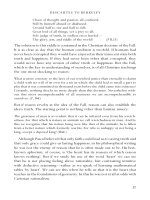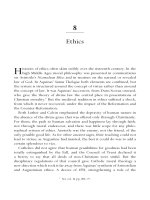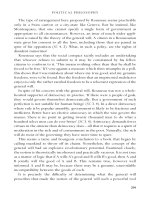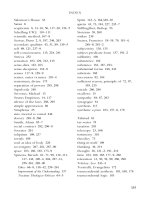The rise of modern philosophy a new history of western philosophy volume 3 (new history of western philosophy) ( PDFDrive ) (1) 286
Bạn đang xem bản rút gọn của tài liệu. Xem và tải ngay bản đầy đủ của tài liệu tại đây (21.37 KB, 1 trang )
ETHICS
not intentional. A good purpose is essential if an action is to be morally
good.
Hegel resembles Kant in the emphasis he places on the importance of
purpose, or ultimate motive. But he does not agree with him that duty is
the only morally worthy purpose, and he does not appeal to the principle
of universalizability as the criterion of moral acceptibility. Kant’s formula
of universal law, he complains, allows in some highly suspect maxims
(PR, 148).
The mere belief that one’s purpose is good does not suYce to render an
action morally correct. Following one’s conscience is indeed necessary, but
not suYcient, for virtuous behaviour. Hegel stands at a distance from those
subjectivists, before him and after him, who have claimed that the individual conscience is the ultimate court of appeal. Here, as elsewhere, Hegel
is well aware of the social context of private judgement.
When we turn to the third section of Hegel’s ethical system, uprightness,
the social element becomes clearly dominant. For uprightness consists of
self-harmony in one’s social life; it concerns the concrete, external aspect of
ethical behaviour, and this must take place in an institutional setting. This
section of the Philosophy of Right examines the nature of three social structures in which individuals Wnd themselves: the family, civil society, and the
state. Its exposition belongs, therefore, rather to the succeeding chapter on
political philosophy than to the present chapter on ethics.
The period covered by this volume is an instructive one for anyone who
wishes to inquire to what extent metaphysics is a guide to ethics. Of the
great seventeenth-century metaphysicians, Descartes produced an ethical
system which, despite the recent respectful attention of scholars, is generally regard as too jejune to be a key to life, while Spinoza devised an ethics
which is so closely interwoven with his metaphysics that it can give
guidance only to those who share his cosmic outlook. On the other
hand, two great philosophers of the eighteenth century still exercise
substantial inXuence on moral philosophy, precisely because their ethics
stands at a distance from metaphysics. Hume insisted that moral prescriptions should be quite separate from any judgements of fact, whether
physical or (if such were possible) metaphysical: an ‘ought’ never followed
from an ‘is’. Kant, on the other hand, though the greatest metaphysician of
271









